 Go to A-Z Databases: Books & eBooks to search for more eBooks. Must be on campus or login with your COM account for off campus access.
Go to A-Z Databases: Books & eBooks to search for more eBooks. Must be on campus or login with your COM account for off campus access.
Want more on finding books or eBooks? Try our How to Use Books & eBooks guides.
-
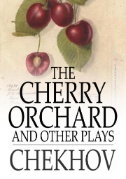 The Cherry Orchard and Other Plays
by
Anton Pavlovich Chekhov
The Cherry Orchard was written by Chekhov as a comedy, but directed by Stanislavski as a tragedy on its premier. The play has maintained the dual nature of these intentions ever since. An aristocratic family return to their estate on the eve of auction. Though alternatives present themselves, the family is apathetic and their property is sold. The play addresses the vast changes to the Russian social casts at the time, and the general cultural futility experienced by the aristocracy and bourgeoisie in their shifting roles.
The Cherry Orchard and Other Plays
by
Anton Pavlovich Chekhov
The Cherry Orchard was written by Chekhov as a comedy, but directed by Stanislavski as a tragedy on its premier. The play has maintained the dual nature of these intentions ever since. An aristocratic family return to their estate on the eve of auction. Though alternatives present themselves, the family is apathetic and their property is sold. The play addresses the vast changes to the Russian social casts at the time, and the general cultural futility experienced by the aristocracy and bourgeoisie in their shifting roles.
-
 The Complete Dramatic Works of Samuel Beckett
by
Samuel Beckett
The present volume gathers all of Beckett's texts for theatre, from 1955 to 1984. It includes both the major dramatic works and the short and more compressed texts for the stage and for radio. 'He believes in the cadence, the comma, the bite of word on reality, whatever else he believes; and his devotion to them, he makes clear, is a sufficient focus for the reader's attention. In the modern history of literature he is a unique moral figure, not a dreamer of rose-gardens but a cultivator of what will grow in the waste land, who can make us see the exhilarating design that thorns and yucca share with whatever will grow anywhere.' - Hugh Kenner Contents: Waiting for Godot, Endgame, Happy Days, All That Fall, Acts Without Words, Krapp's Last Tape, Roughs for the Theatre, Embers, Roughs for the Radio, Words and Music, Cascando, Play, Film, The Old Tune, Come and Go, Eh Joe, Breath, Not I, That Time, Footfalls, Ghost Trio,...but the clouds..., A Piece of Monologue, Rockaby, Ohio Impromptu, Quad, Catastrophe, Nacht und Traume, What Where.
The Complete Dramatic Works of Samuel Beckett
by
Samuel Beckett
The present volume gathers all of Beckett's texts for theatre, from 1955 to 1984. It includes both the major dramatic works and the short and more compressed texts for the stage and for radio. 'He believes in the cadence, the comma, the bite of word on reality, whatever else he believes; and his devotion to them, he makes clear, is a sufficient focus for the reader's attention. In the modern history of literature he is a unique moral figure, not a dreamer of rose-gardens but a cultivator of what will grow in the waste land, who can make us see the exhilarating design that thorns and yucca share with whatever will grow anywhere.' - Hugh Kenner Contents: Waiting for Godot, Endgame, Happy Days, All That Fall, Acts Without Words, Krapp's Last Tape, Roughs for the Theatre, Embers, Roughs for the Radio, Words and Music, Cascando, Play, Film, The Old Tune, Come and Go, Eh Joe, Breath, Not I, That Time, Footfalls, Ghost Trio,...but the clouds..., A Piece of Monologue, Rockaby, Ohio Impromptu, Quad, Catastrophe, Nacht und Traume, What Where.
-
 Death of a Salesman Certain Private Conversations in Two Acts and a Requiem
by
Arthur Miller
The Pulitzer Prize-winning tragedy of a salesman’s deferred American dream
Ever since it was first performed in 1949, Death of a Salesman has been recognized as a milestone of the American theater. In the person of Willy Loman, the aging, failing salesman who makes his living riding on a smile and a shoeshine, Arthur Miller redefined the tragic hero as a man whose dreams are at once insupportably vast and dangerously insubstantial. He has given us a figure whose name has become a symbol for a kind of majestic grandiosity—and a play that compresses epic extremes of humor and anguish, promise and loss, between the four walls of an American living room.
Death of a Salesman Certain Private Conversations in Two Acts and a Requiem
by
Arthur Miller
The Pulitzer Prize-winning tragedy of a salesman’s deferred American dream
Ever since it was first performed in 1949, Death of a Salesman has been recognized as a milestone of the American theater. In the person of Willy Loman, the aging, failing salesman who makes his living riding on a smile and a shoeshine, Arthur Miller redefined the tragic hero as a man whose dreams are at once insupportably vast and dangerously insubstantial. He has given us a figure whose name has become a symbol for a kind of majestic grandiosity—and a play that compresses epic extremes of humor and anguish, promise and loss, between the four walls of an American living room.
-
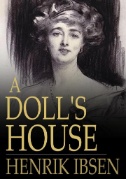 A Doll's House
by
Henrik Ibsen
When A Doll's House was first published in 1879 it created a sensation. The play follows the ordinary life of a housewife. Gradually the tensions within her marriage become clear and build to a final, stunning action. The play is widely studied because of its sharp critique of 19th century marriage norms, and its feminist tendencies.
A Doll's House
by
Henrik Ibsen
When A Doll's House was first published in 1879 it created a sensation. The play follows the ordinary life of a housewife. Gradually the tensions within her marriage become clear and build to a final, stunning action. The play is widely studied because of its sharp critique of 19th century marriage norms, and its feminist tendencies.
-
 Hamlet
by
William Shakespeare
Dive into the tragedy that many critics regard not only as Shakespeare's finest play, but also as one of the best literary works ever produced. Set in Denmark, Hamlet recounts the events that transpire after the King is murdered by his brother Claudius, who then marries his brother's widow. Prince Hamlet uncovers the true nature of his father's death and feigns madness to create a trap. A must-read for fans of classic literature.
Hamlet
by
William Shakespeare
Dive into the tragedy that many critics regard not only as Shakespeare's finest play, but also as one of the best literary works ever produced. Set in Denmark, Hamlet recounts the events that transpire after the King is murdered by his brother Claudius, who then marries his brother's widow. Prince Hamlet uncovers the true nature of his father's death and feigns madness to create a trap. A must-read for fans of classic literature.
-
 The Iceman Cometh
by
Eugene O'Neill
A critical edition of O'Neill's most complex and difficult play, designed for student readers and performers This critical edition of Eugene O'Neill's most complex and difficult play helps students and performers meet the work's demanding cultural literacy. William Davies King provides an invaluable guide to the text, including an essay on historical and critical perspectives; extensive notes on the language used in the play, and its many musical and literary allusions; as well as numerous insightful illustrations. He also gives biographical details about the actual people the characters are based on, along with the performance history of the play, to help students and theatrical artists engage with this labyrinthine work.
The Iceman Cometh
by
Eugene O'Neill
A critical edition of O'Neill's most complex and difficult play, designed for student readers and performers This critical edition of Eugene O'Neill's most complex and difficult play helps students and performers meet the work's demanding cultural literacy. William Davies King provides an invaluable guide to the text, including an essay on historical and critical perspectives; extensive notes on the language used in the play, and its many musical and literary allusions; as well as numerous insightful illustrations. He also gives biographical details about the actual people the characters are based on, along with the performance history of the play, to help students and theatrical artists engage with this labyrinthine work.
-
 The Importance of Being Earnest
by
Oscar Wilde
The Importance of Being Earnest is the last play Oscar Wilde ever wrote, and remains his most enduringly popular. It makes fun of social graces in the late Victorian era. Two seemingly unrelated parties are thrown into ridiculous entanglement when their fake identities, maintained in order to escape social responsibilities, grow ever more complicated to uphold.
The Importance of Being Earnest
by
Oscar Wilde
The Importance of Being Earnest is the last play Oscar Wilde ever wrote, and remains his most enduringly popular. It makes fun of social graces in the late Victorian era. Two seemingly unrelated parties are thrown into ridiculous entanglement when their fake identities, maintained in order to escape social responsibilities, grow ever more complicated to uphold.
-
 Long Day's Journey into Night
by
Eugene O'Neill
Eugene O'Neill's autobiographical play Long Day's Journey into Night is regarded as his finest work. First published by Yale University Press in 1956, it won the Pulitzer Prize in 1957 and has since sold more than one million copies. This edition, which includes a new foreword by Harold Bloom, coincides with a new production of the play starring Brian Dennehy, which opens in Chicago in January 2002 and in New York in April.
Long Day's Journey into Night
by
Eugene O'Neill
Eugene O'Neill's autobiographical play Long Day's Journey into Night is regarded as his finest work. First published by Yale University Press in 1956, it won the Pulitzer Prize in 1957 and has since sold more than one million copies. This edition, which includes a new foreword by Harold Bloom, coincides with a new production of the play starring Brian Dennehy, which opens in Chicago in January 2002 and in New York in April.
-
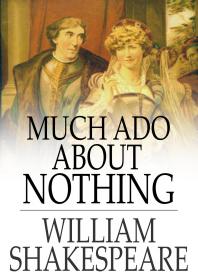 Much Ado about Nothing
by
William Shakespeare
Shakespeare's comedy play Much Ado About Nothing pivots around the impediments to love for young betrothed Hero and Claudio when Hero is falsely accused of infidelity and the "lover's trap" set for the arrogant and assured Benedick who has sworn of marriage and his gentle adversary Beatrice. The merry war between Benedick and Beatrice with the promptings of their friends soon dissolves into farcical love, while Hero's supposed infidelity is shown to be little more than "much ado about nothing".
Much Ado about Nothing
by
William Shakespeare
Shakespeare's comedy play Much Ado About Nothing pivots around the impediments to love for young betrothed Hero and Claudio when Hero is falsely accused of infidelity and the "lover's trap" set for the arrogant and assured Benedick who has sworn of marriage and his gentle adversary Beatrice. The merry war between Benedick and Beatrice with the promptings of their friends soon dissolves into farcical love, while Hero's supposed infidelity is shown to be little more than "much ado about nothing".
-
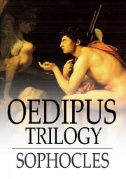 Oedipus Trilogy: Oedipus the King, Oedipus at Colonus & Antigone
by
Sophocles
Oedipus the King is Sophocles' legendary rendition of the myth of the great king Oedipus, perhaps the best known of all of the Greek Tragedies. When an oracle foretells that the young prince Oedipus will grow up to murder his father he is cast out of the kingdom by the king who hopes by doing so that he will avoid his fate. Oedipus grows up and many years later, not knowing his own identity, or the identity of his father, meets him at a crossroad where they argue and the king is killed. The rest of the tale pivots around the unraveling of this tangled family history and the appalling discovery of, not only patricide, but Oedipus' subsequent incest in unwittingly marrying his own mother.
Oedipus Trilogy: Oedipus the King, Oedipus at Colonus & Antigone
by
Sophocles
Oedipus the King is Sophocles' legendary rendition of the myth of the great king Oedipus, perhaps the best known of all of the Greek Tragedies. When an oracle foretells that the young prince Oedipus will grow up to murder his father he is cast out of the kingdom by the king who hopes by doing so that he will avoid his fate. Oedipus grows up and many years later, not knowing his own identity, or the identity of his father, meets him at a crossroad where they argue and the king is killed. The rest of the tale pivots around the unraveling of this tangled family history and the appalling discovery of, not only patricide, but Oedipus' subsequent incest in unwittingly marrying his own mother.
-
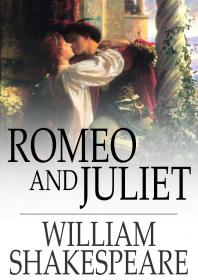 Romeo and Juliet
by
William Shakespeare
Romeo and Juliet is one of Shakespeare's early tragedies. The two young title characters fall madly in love, but are the children of feuding houses whose hatred for each other works to a devastating end. The play was immensely popular in Shakespeare's lifetime and is the most enduring of his plays along with Hamlet. Romeo and Juliet is considered one of the archetypal love stories.
Romeo and Juliet
by
William Shakespeare
Romeo and Juliet is one of Shakespeare's early tragedies. The two young title characters fall madly in love, but are the children of feuding houses whose hatred for each other works to a devastating end. The play was immensely popular in Shakespeare's lifetime and is the most enduring of his plays along with Hamlet. Romeo and Juliet is considered one of the archetypal love stories.
 Go to A-Z Databases: Books & eBooks to search for more eBooks. Must be on campus or login with your COM account for off campus access.
Go to A-Z Databases: Books & eBooks to search for more eBooks. Must be on campus or login with your COM account for off campus access. Much Ado about Nothing
by
William Shakespeare
Shakespeare's comedy play Much Ado About Nothing pivots around the impediments to love for young betrothed Hero and Claudio when Hero is falsely accused of infidelity and the "lover's trap" set for the arrogant and assured Benedick who has sworn of marriage and his gentle adversary Beatrice. The merry war between Benedick and Beatrice with the promptings of their friends soon dissolves into farcical love, while Hero's supposed infidelity is shown to be little more than "much ado about nothing".
Much Ado about Nothing
by
William Shakespeare
Shakespeare's comedy play Much Ado About Nothing pivots around the impediments to love for young betrothed Hero and Claudio when Hero is falsely accused of infidelity and the "lover's trap" set for the arrogant and assured Benedick who has sworn of marriage and his gentle adversary Beatrice. The merry war between Benedick and Beatrice with the promptings of their friends soon dissolves into farcical love, while Hero's supposed infidelity is shown to be little more than "much ado about nothing".
 Romeo and Juliet
by
William Shakespeare
Romeo and Juliet is one of Shakespeare's early tragedies. The two young title characters fall madly in love, but are the children of feuding houses whose hatred for each other works to a devastating end. The play was immensely popular in Shakespeare's lifetime and is the most enduring of his plays along with Hamlet. Romeo and Juliet is considered one of the archetypal love stories.
Romeo and Juliet
by
William Shakespeare
Romeo and Juliet is one of Shakespeare's early tragedies. The two young title characters fall madly in love, but are the children of feuding houses whose hatred for each other works to a devastating end. The play was immensely popular in Shakespeare's lifetime and is the most enduring of his plays along with Hamlet. Romeo and Juliet is considered one of the archetypal love stories.
![]()